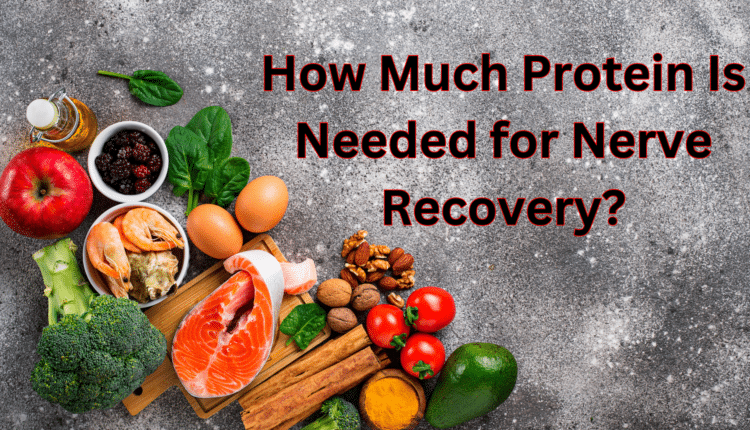How Much Protein Is Needed for Nerve Recovery?
Proteins protect the nerves during recovery. Beyond building muscle, it is essential for healing and recovery. Without substantial protein intake, you may be at risk of developing sarcopenia—a condition that quietly leads to muscle deterioration.
What is Sarcopenia?
Sarcopenia, officially recognized as a disease in 2016, is categorized by the loss of muscle mass, physical performance, and strength due to aging or inactivity. While it primarily affects the muscles, sarcopenia damages the central and peripheral nervous systems.
Protein strengthens and rebuilds nerves and muscles, making it the best way to combat sarcopenia.
How Much Protein Do You Need to Eat?
One of the most commonly asked questions is, “How much protein do I need?” While it is an important question, replacing and rebuilding muscle requires more just eating protein.
The time of day you eat protein and how you stimulate muscle sensitivity to utilize it also plays an important role.
To prevent or overcome sarcopenia, the average person, male or female, should consume 1 gram of protein per pound of ideal body weight. So, if you weigh 180 lbs and want to be 130 lbs, you should only consume 130 grams of protein. The same goes for any weight.
To beat sarcopenia, the intake is higher than the RDA’s recommendations, which state you only need 0.36 grams of protein per pound of body weight (0.8 grams per kg). However, the RDA bases its recommendations around the amount of nutrients to prevent a deficiency, meaning the bare minimum to keep you alive.
When dealing with sarcopenia or muscle loss, patients need more than the bare minimum.
What is the Best Time of Day to Eat Protein?
Young people have strong, healthy cells, making them more efficient at avoiding protein degradation or breakdown.
As we age, especially after fifty, the time of day you eat protein makes a tremendous difference in the health of skeletal muscle and your ability to add more muscle.
As the saying goes, breakfast is the most important meal of the day. Eating protein at the first meal sets the stage for good muscle health and growth. The first meal may be at 11 a.m. or later for those who do intermittent fasting.
Once you pass your fifties, more extended periods of fasting may impair skeletal muscle development. Research shows the first meal should contain 40-50 grams of protein to stimulate skeletal muscle development.
40 grams of protein may include four eggs and four slices of turkey bacon. If that is too much food in one sitting, there are a few ways to ensure you get adequate intake.
Distribute Protein Intake Throughout the Day
Spreading your intake evenly across meals helps maintain amino acids in the blood, which supports muscle protein synthesis throughout the day.
For instance, eating 25-30 grams of protein at each meal might be more manageable, but you still need to hit your target of one grams of protein per pound of ideal body weigh for the day.
Include Leucine Rich Foods
Leucine, a critical amino acid, plays a crucial role in triggering muscle protein synthesis (MPS). Incorporating leucine-rich sources like meats and fish, whey protein, and cheeses like goat cheese, parmesan, romano, and gouda cheese are excellent sources.
For vegans, we recommend lentils or spirulina. They provide less leucine but can maximize the MPS response even if the total protein intake is lower.
Add Protein Powder to Smoothies
If getting all the required protein in one meal proves difficult, adding a protein shake or two throughout the day will help you hit your total grams of protein for the day.
Dr. Coppola and Dr. Monteiro suggest pasture-raised goat whey.
Exercise
Any exercise, whether resistance training or light physical activity before a meal, stimulates muscle protein synthesis. Even if the intake is lower, the combination of protein and exercise provides a synergistic effect.
Simple neuropathy exercises are sufficient for neuropathy sufferers who cannot engage in a rigorous workout. We recommend starting with one or two exercises if your symptoms are severe.
Kidney Health and High-Protein Diets
Many decades ago, doctors believed that high-protein diets caused kidney damage and led to chronic kidney disease. With more research into the theory, scientists acknowledge there is no link between high protein intake and kidney damage.
A 2018 study analyzed data from 28 papers published between 1975 and 2016 and found no evidence of high-protein diets causing adult kidney damage. The studies included more than 1,300 participants, including healthy, obese, and type 2 diabetes or high blood pressure.
None of the patients in the study were diagnosed with chronic kidney disease.
Another study found that protein intakes of 170-243% of the recommended dietary allowance did not impair renal function in a group of 37 athletes.
With the right tools and knowledge, muscle and nerve recovery is possible and protein is at the heart of it all.
Struggling with Neuropathy?
Dr. Coppola and Dr. Monteiro’s dedication to combating neuropathy is deeply personal, stemming from Dr. Monteiro’s experience with her mother’s severe chemo-induced neuropathy. This personal journey fueled their commitment to develop a systematic, drug-free approach to reversing neuropathy.
They founded the San Antonio Neuropathy Center, where they’ve successfully treated over 18,000 patients over the past two decades. Their acclaimed book, “Defeat Neuropathy Now in Spite of Your Doctor,” along with their neuropathy product line, stands as a testament to their expertise and innovative solutions.
Recognized as leading neuropathy specialists in America, Dr. Coppola and Dr. Monteiro offer a beacon of hope for those diagnosed with this challenging condition. If you or a loved one is seeking relief from neuropathy, reach out to us at 844 400-0101 or email us through our contact page – Click here.
Your path to healing can start today.


Comments are closed, but trackbacks and pingbacks are open.